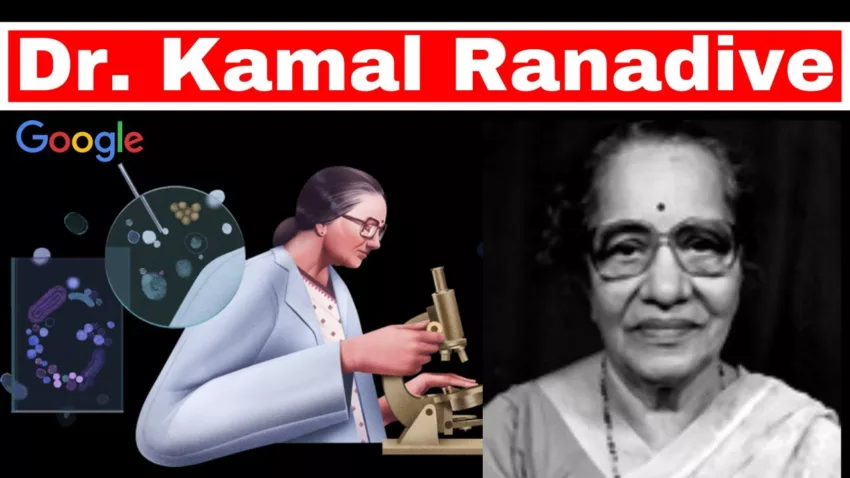Dr. Kamal Ranadive was one of those women who made her mark in the field of science during the period when it was very rare. She secured her seat in the science stream at Pune’s reputed Fergusson College.
She completed her graduation from college with a bachelor’s of science in 1934 and later obtained a doctorate in cytology from Bombay University.
She was a founding member of the Indian Women Scientists’ Association in Maharashtra. The association worked for rural communities and offered training to women to work in healthcare and advising the population on health practices and medical care.
Google Remembered Dr. Kamal Ranadive with a Doodle:
To honor her contributions to cell biology, on Monday, November 8, 2021, Google dedicated a doodle to celebrate her 104th birth anniversary. The doodle was dedicated to commemorating her unparallel contribution to cancer research. She was a prominent cell biologist and a biomedical researcher who conducted some groundbreaking cancer research about the links between cancers and viruses.
An artist named Ibrahim Rayintakath created the Google doodle that showed Dr. Ranadive with a microscope. While dedicating the Google Doodle to her, Google wrote:
“Ranadive also encouraged students and Indian scholars abroad to return to their own country and use their knowledge to work for their communities. After retiring in 1989, the scientist worked in rural communities in Maharashtra, training women as healthcare workers, and providing health and nutrition education. The IWSA has 11 chapters in India and provides scholarships and childcare options for women in science.”
Her Early Life and Education:
The real name of Dr. Kamal Ranadive was Dr. Kamal Samarath. She was born in Pune in 1917. Her family wanted her to pursue medical education, but she was more interested in making a career in biology. In 1949, she obtained a doctorate in cytology while working as a researcher at the Indian Cancer Research Center (ICRC).
She had completed her postdoctoral research fellowship to work on tissue culture at Johns Hopkins University in Baltimore and upon returning to India, she founded India’s first culture laboratory at ICRC Mumbai. She also worked at Tata Memorial Hospital when she was in Mumbai.
Dr. Kamal Ranadive’s Professional Career:
When she came back to India from Baltimore, Ranadive rejoined ICRC as a Senior Research Officer. She established Experimental Biology Laboratory and Tissue Culture Laboratory in Bombay. Dr. Kamal headed as a Director of the Indian Cancer Research Centre from 1966-1970. In the 1960s, she developed tissue culture media and related reagents. She became instrumental in establishing new research units in Carcinogenesis, Cell Biology, and Immunology.
Awards and Honors:
Dr. Ranadive received several awards and accolades for her significant contribution to the field of biology. She was awarded India’s third highest civilian award Padma Bhushan for Medicine, in 1982. She also received the first Silver Jubilee Research Award in 1964, from the Medical Council of India and was also awarded the G. J. Watumull Foundation Prize for 1964 in microbiology.
Research Papers:
Some of her published research papers are:
- Betel quid chewing and oral cancer: Experimental studies on hamsters
- Effect of Urethan on Nucleic Acids
- Influence of splenectomy on the development of leukemia in male mice of the ICRC strain
- Characterization of mammary tumor virus of strain ICRC mouse
- What is Epic Games Launcher and How to Install It? - July 15, 2024
- What Is Audius Music Streaming App and How Does it Work? - July 13, 2024
- The 10 Best Astronomy Apps for Stargazing - July 12, 2024

